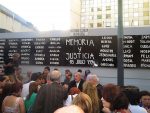Recently, I met an old friend. During our conversation over coffee, he asked if I was still involved with the Jewish Seniors Alliance of Greater Vancouver. “Of course,” I said. With a funny look on his face, he said, “You are putting a lot of time into this work.”
His remark and the look irritated me quite a bit, and I said, “Joe, you are probably 10 years younger than I am, you have your wife and children near you, you are a lucky man. You are also financially independent. It may be possible that you are not aware and possibly don’t care about what is happening around you – you are complacent.”
Let me bring Joe – and you – up to date.
There are several hundred elders in our community who are poor, lonely, marginalized or abused. JSA is making every possible effort to find these isolated individuals in order to help them.
In its outreach and advocacy programs, JSA is contributing to the well-being of countless elders with our educational programs. We reach out to these people through our two forums and four Empowerment Series sessions yearly; through our Senior Line magazine, which is published three times a year and contains current, relevant and well-research articles; and by means of our website, which not only informs but entertains.
And Joe, why should your indifferent attitude change? You are OK and you believe that JSA has nothing to offer you. But, there are hundreds of seniors giving of their time and wisdom to help other seniors. Something else you should know Joe – sooner or later, almost every senior needs help.
At our annual general meeting in September, JSA will be honoring a few individuals selected by their organizations for their extensive volunteer work for Vancouver’s seniors. And Joe, please note that JSA’s events are cost-free and are not fundraisers. Our outreach programs have a preventive focus, so that people like us remain functioning and enjoying a healthy life for as long as possible.
And Joe, if you think that this is all, let me tell you about our Peer Support Program, which JSA started almost four years ago.
Our two professionals have trained more than 100 senior volunteers to be peer counselors: to give emotional support, to conduct weekly visits at seniors’ homes and to make weekly phone calls. The peer counselor takes a 55-hour training course, and the callers and visitors take a 17.5-hour training course.
These trained volunteers come from every walk of life and different cultural backgrounds, and they speak many languages. They have a clean police record and they sign a confidentiality agreement. Their commitment to JSA is for at least one year. To date, we have more than 50 volunteers servicing more than 150 families.
JSA also provides referrals to seniors and their families, enabling them to access benefits and services offered by the municipal, provincial and federal governments. JSA’s bereavement support program helps seniors, either individually or in a group setting.
Last year, JSA trained 11 seniors to be ambassadors for creating awareness of senior abuse in homes and institutions. They talk to individuals or groups of seniors, and more than 300 seniors have benefited so far from this program.
Frankly, Joe, I shudder at the thought of what would happen if JSA were unable to provide these unique services in our community. We are in contact with 5,000 seniors, and we are doing our best to inform, educate and entertain them.
Seniors have the untapped power to help themselves politically. Unfortunately, this power is being wasted by either disinterest or failing to act. Only 650 to 700 seniors have chosen to be members of JSA, although it costs a mere $18 a year.
JSA must exist, grow and be able, with the support of the community, to provide these services. However, community involvement and financial support and interest are crucial. Without volunteers, nothing would be possible!
How about you Joe? You are not involved in anything right now – perhaps it is about time to start giving of yourself to our community?
Serge Haber is president emeritus of Jewish Seniors Alliance of Greater Vancouver. A version of this article was originally published in the June issue of the organization’s magazine, Senior Line.






